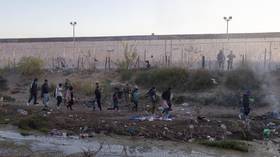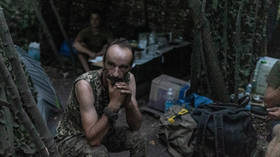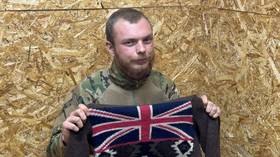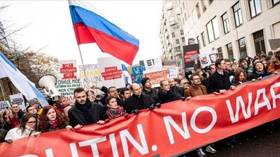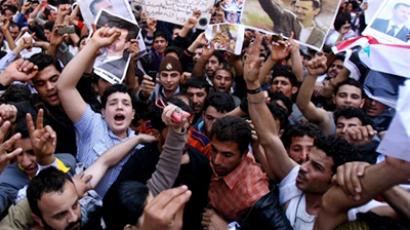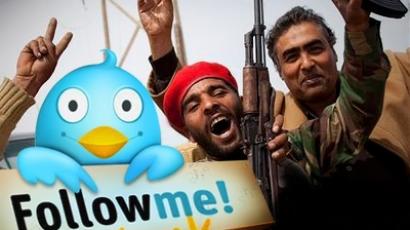Fears West is following Libyan roadmap for Syria
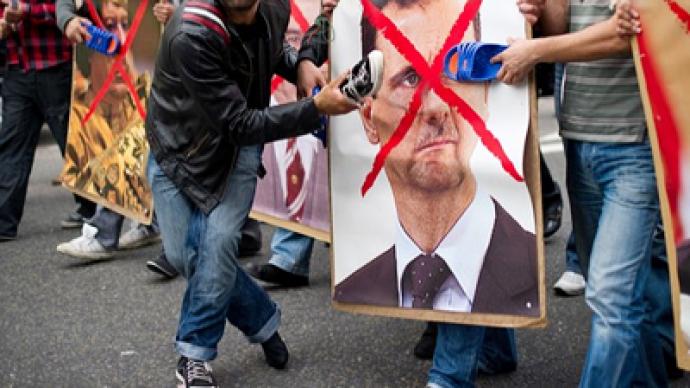
International pressure is mounting on Syria, with its government intensifying crackdowns on rioting opposition, but there is concern that the West’s response has very little to do with the promotion of peace.
Seven weeks of clashes between the Syrian army and law enforcement have resulted in the deaths of 757 people – 80 of them were killed during an 11-day siege of the city of Deraa. Over 9,000 have been arrested.The main focus now is the city of Homs and surrounding villages, with a special operation involving tanks and armored vehicles. Syria’s Ministry of Interior reports that there have been multiple arrests of “extremists” and capturing of arms depots and munitions.The ministry also states that 2,684 people used an announced amnesty to voluntarily lay down arms. They were released after promising not to be involved in acts of violence.UN Secretary General Ban Ki-moon addressed Syrian authorities calling for humanitarian aid to be allowed into the country.Speaking to journalists in Geneva on Wednesday he expressed disappointment that “the humanitarian assessment team has not yet been given the access it needs,” despite the Syrian president’s prior promise to do so.
Following in America's footsteps, the European Union has slapped fresh sanctions on Syria's top officials, including an arms embargo and travel ban.Armed Syrian rebels continue to clash with security forces. Many have been arrested and hundreds have died, prompting the West to call for the bloodshed to stop, with sanctions slapped down and arms sales embargoed.This sounds very similar to how events played out in Libya. And Syria’s African Arab neighbor has been suffering NATO bombings for nearly two months now under the very same pretext – protecting civilians. For war-watchers, Syria is seeing a regime descent that is tantalizing Western leaders.“There is great excitement in Washington at the prospect of overthrowing the Syrian government, it's been on the front burner in Washington ever since the Bush administration," shared war correspondent and columnist Eric Margolis.The EU has put the freeze on assets of the 13 top Syrian government, military and intelligence leaders. Topping the list is Maher Al-Assad, the Syrian president's younger brother. He is described as the “principal overseer of violence against protestors”. But no sanctions are being applied to the man calling the shots: President Bashar Assad himself. To some, Assad is a convenient ally for the West; although that is what was being said about Gaddafi in recent years, before the sanctions kicked in.“Some of the EU member countries, including Germany, perhaps think there's still a possibility of doing business with Bashar: he's Western educated, with a Western educated wife as well, so they see perhaps he might be the force of moderation in the country,” believes Rob Lyons, deputy editor of online magazine Spiked.The EU says Assad could be censored if he fails to stop the brutal crushing of opposition. But he need not worry. The Arab Lawyers' Association says no-one who is savvy would keep assets in their own names, so sanctions are toothless.“The UN and international community are being reduced from international organizations into a domestic police authority, whereby you begin to freeze the assets of individuals,” points out Sabah Al-Mukhtar of the Arab Lawyers' Association. “Sometimes the individuals do not actually have assets anywhere. It is a gimmick which is being used in most instances, and this gimmick in fact is counterproductive because it just makes noises, but is does not have any affect. I think it is discredited.”Effective or not, Europeans have grown familiar with imposing sanctions. But that was relatively easy to apply to Libya, which had long been suffering isolation – even among Arab states. But Syria has friends the West might be reluctant to provoke.“It is not only because Syria is in a very sensitive environment, as there is, of course, the prevailing difficult situation, the official war situation with Israel,” said Barah Mikail, a senior researcher on Middle East issues at the Madrid-based think tank Fride.“You also have all these connections that Syria has with Iran, with the Lebanese Hezbollah, as well as with the Palestinian Hamas, which makes it very dangerous for the so-called international community to come with a military intervention in Syria, with no alternative to president Bashar Assad's regime,” he said.The UK has led the charge in pushing for a quicker response to the Syrian crackdown. British Foreign Secretary William Hague says he welcomes the sanctions. But to a battle-weary British public, this looks all too familiar. It is more than six weeks since sanctions on Libya were judged a failure. And many in Britain feel a roll of the diplomatic dice against Syria can only prompt a similar fate, and see the Mediterranean gunships sail East.
The sanctions imposed on Syria are more symbolic than effective, believes James Denselow, a London-based writer on Middle East politics and security issues.Decades of sanctions imposed by the US have been preventing Syria from buying military equipment leaving Syrians to help themselves. The country really became sanctions-proof and the new ones actually do “zero reality change on the ground.”The very fact that president Bashar Assad has not been on the list of the top 13 Syrian officials whose assets were frozen in Europe means that the EU gives the president one last chance to see “if the dictator can dictate,” says Denselow, but “it remains to be seen whether he is the man that can change things on the ground.”Still, the Libyan scenario is impossible for Syria, adds Denselow.
Azzam Tamimi, director of the Institute of Islamic Political Thought, told RT that neither foreign intervention nor sanctions would help solve the problems in Syria.“In Libya, the foreign intervention only complicated things,” he said. “The intervention has not helped settle the problem in Libya, and I don’t think it will help settle the problem in Syria. And we’ve seen sanctions. There’s a history of adopting sanctions in various places, including Iraq, for many, many years, and only the people suffered throughout the time when sanctions were imposed.”





